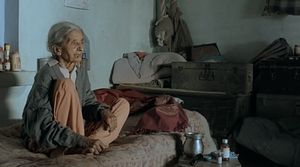When we talk about rural India, the first thing that comes to mind is poverty. It might evoke sympathy — often, even empathy — but what poverty truly means and can do to the impoverished remains beyond our grasp.
Amma Meri (“My Mother”) is an indie short film that seeks to bridge the gap between the imagined and the actual.
At its very worst, poverty can render humans unable to distinguish between right and wrong — or even unable to afford the luxury of discerning between right and wrong. Mix into this the demands of an orthodox society, and you may have a recipe for tragedy.
In India, untold numbers of poor farmers kill themselves every year, their troubles compounded by crop failures, indebtedness, and abysmal government policies. Hovering over this swamp is a looming cloud of societal customs, paying the huge expenses of which only aggravates pre-existing penury. This is the common paradox in Indian villages: the widow of a farmer who has committed suicide because of debt must take on the burden of additional loans to carry out the last rites.
Set in a north Indian village, Amma Meri tells the story of a marginal farmer, Balram, who unwillingly becomes a milkman after his father dies. Although already neck-deep in debt, Balram needs a large sum of money to pay the dowry for his daughter’s marriage. Upon discovering that he stands to inherit his mother’s fixed deposit after her death, he prepares to kill her. This is his grievous quandary: his mother’s life or his daughter’s wedding.
Who must take the blame: Balram or society?
Tarun Jain, the director, says, “With this film, I was looking to explore the intimate journey of a man who is filled with remorse on the arrival of a fleeting thought of killing his mother. [It is] a story that emphasises how one can be trapped into thinking or doing something as grave as killing one’s own mother. One cannot deny that societal pressure can sometimes overpower a relationship as sacred as that of a child and a mother.”
Jain says that he set the film in a north Indian village because of his long familiarity and association with rural societies. “In the past one decade, I have constantly got involved in projects which were shot in [the states of] Uttar Pradesh and Haryana. This gave me access to the personal lives of the local residents. I got to be in their company, had conversations with them, and began to observe their culture, set-up, social stigmas, educational background, their needs, their motivations, and so on.”
Amma Meri has been screened at several national and international festivals, and has won 12 awards in various categories. It opened at the International Documentary and Short Film Festival of Kerala. It is due to be released online soon.

































